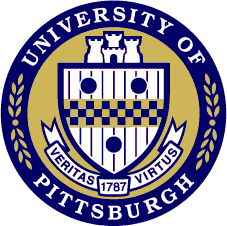Genomics and Personalized Care in Health Systems

Genomics Course Syllabus:
Credits: Three (3) Semester Credits
Session: Spring Session
Day/Time: Monday, 5:00 p.m. - 8:00 p.m.
Instructor: Leming Zhou, PhD, (412) 383-6653; lzhou1@pitt.edu
Course Description:
This course will focus on general introduction to genomics, gene structure and annotation, gene and disease association, and genomic information security. These topics will be presented and discussed in detail. Other topics such as RNA and protein structure, microarray experiments, and DNA sequencing technologies will also be briefly covered. Students will understand gene structure and annotation by working on novel gene annotation projects in the lab sessions.Student Objectives:
Upon completion of this course, students should be able to:- Explain eukaryotic gene structure and molecular biology central dogma
- Demonstrate the skills of annotating eukaryotic genes using online tools
- Demonstrate the skills of performing sequence similarity search using blast
- Demonstrate the skills of collecting evidence from UCSC genome browser
- Describe major DNA and protein databases and the method of extracting data from them
- Explain major gene finding methods, their advantages and disadvantages
- Describe different types of genetic diseases and the relationship between genetic variations and diseases
- Demonstrate the skills of determining protein and RNA secondary structures using online tools
- Explain basic ideas behind microarray and DNA sequencing technologies
- Recognize the importance of protecting personal genomic information and describe several ways of protecting the information
Methods of Presentation:
Lecture:
Each new topic will be presented and explained. This will be substantiated by the use of the materials of text books, handouts, web sites, case studies, and class discussion.In-Class Laboratory Session:
In-class lab sessions will be arranged so that students get familiar with online data mining and gene annotation tools.Student Project and Presentation:
Each student will work on one gene annotation project. Each student will write a report about the project and present his/her results in the last class of the course.Term Paper:
Each graduate student will investigate one specific topic related to the class and approved by the instructor. A scholarly term paper is required to report the results of the investigation.Methods of Evaluations:
The final grade for undergraduate students will be composed of the following:| Class Participation | 10% |
| Homework Assignments | 30% |
| Gene Annotation Project | 30% |
| Final Exam | 30% |
| Homework Assignments | 20% |
| Project | 25% |
| Term Paper | 25% |
| Final Exam | 30% |
Required Textbook:
- Bioinformatics and Functional Genomics, Jonathan Pevsner, 2nd Edition, Wiley-Blackwell, 2009.
- Genes and Disease, by National Center for Biotechnology Information (NCBI), http://www.ncbi.nlm.nih.gov/books/bookres.fcgi/gnd/gnd.pdf
Course Outline:
| Reading | Topics | |
| Lecture 1 | Chapter 1 | Overview of the course and introduction to DNA, RNA, and protein. |
| Lecture 2 | Chapter 2 | Molecular biology databases |
| Lecture 3 | Chapters 3, 6, and 7 | Sequence alignment |
| Lecture 4 | Chapter 4 | Blast search |
| Lecture 5 | UCSC website | Genome browsers |
| Lecture 6 | Chapter 13 | Gene finding methods - Part I: Theory |
| Lecture 7 | GEP websites | Gene finding methods - Part II: Practices |
| GEP websites | Gene annotation lab | |
| Lecture 8 | Chapter 20, Ebook: Gene and disease | Genomic variations and disease |
| Lecture 9 | Chapters 10 and 11 | Protein/RNA structure |
| Lecture 10 | Chapters 13 and 16 | High-throughput technologies: microarray and next-generation sequencing |
| Course review | ||
| Student presentations | ||
| Final Exam |